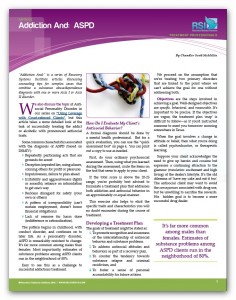 The pattern of anti-social behavior disorder begins in childhood, with conduct disorders, and continues to later life. It’s resistant to change, and about 80% of ASPD clients auffer from substance abuse/dependency problems. We frequently see ASPD clients in programs that provide court-mandated treatment, in pre-release corrections and corrections-related settings. That’s because the symptoms of ASPD include criminal behaviors, as well as deception, aggressiveness, and irresponsibility.
The pattern of anti-social behavior disorder begins in childhood, with conduct disorders, and continues to later life. It’s resistant to change, and about 80% of ASPD clients auffer from substance abuse/dependency problems. We frequently see ASPD clients in programs that provide court-mandated treatment, in pre-release corrections and corrections-related settings. That’s because the symptoms of ASPD include criminal behaviors, as well as deception, aggressiveness, and irresponsibility.
It’s a tough combination. ASPD is resistant to change, and clients with ASPD can be difficult, manipulative, demanding, and even intimidating. But it’s not impossible. With a little leverage and some understanding of effective therapeutic technique, you can increase the chances of successful outcomes with these clients.
The article also includes a copy of the “ASB Quick Assessment” tool:
You can see all of our content relating to addicted offenders in this feed.










